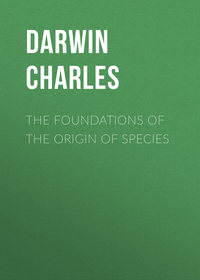
The Foundations of the Origin of Species
186
The cumulative effect of domestication is insisted on in the Origin, see e. g. Origin, Ed. i. p. 7, vi. p. 8.
187
This type of variation passes into what he describes as the direct effect of conditions. Since they are due to causes acting during the adult life of the organism they might be called individual variations, but he uses this term for congenital variations, e. g. the differences discoverable in plants raised from seeds of the same pod (Origin, Ed. i. p. 45, vi. p. 53).
188
«It is not clear where the following note is meant to come»: Case of Orchis, – most remarkable as not long cultivated by seminal propagation. Case of varieties which soon acquire, like Ægilops and Carrot (and Maize) a certain general character and then go on varying.
189
Here, as in the MS. of 1842, the author is inclined to minimise the variation occurring in nature.
190
This is more strongly stated than in the Origin, Ed. i. p. 30.
191
See Origin, Ed. i. p. 13.
192
Origin, Ed. i. p. 86, vi. p. 105.
193
It is interesting to find that though the author, like his contemporaries, believed in the inheritance of acquired characters, he excluded the case of mutilation.
194
This corresponds to Origin, Ed. i. p. 10, vi. p. 9.
195
Origin, Ed. i. p. 8, vi. p. 10.
196
For plasticity see Origin, Ed. i. pp. 12, 132.
197
Var. under Dom., Ed. ii. I. p. 393.
198
Selection is here used in the sense of isolation, rather than as implying the summation of small differences. Professor Henslow in his Heredity of Acquired Characters in Plants, 1908, p. 2, quotes from Darwin’s Var. under Dom., Ed. i. II. p. 271, a passage in which the author, speaking of the direct action of conditions, says: – “A new sub-variety would thus be produced without the aid of selection.” Darwin certainly did not mean to imply that such varieties are freed from the action of natural selection, but merely that a new form may appear without summation of new characters. Professor Henslow is apparently unaware that the above passage is omitted in the second edition of Var. under Dom., II. p. 260.
199
See the Essay of 1842, p. 3.
200
See Origin, Ed. i. p. 33, vi. p. 38. The evidence is given in the present Essay rather more fully than in the Origin.
201
Journal of Researches, Ed. 1860, p. 214. “Doggies catch otters, old women no.”
202
The effects of crossing is much more strongly stated here than in the Origin. See Ed. i. p. 20, vi. p. 23, where indeed the opposite point of view is given. His change of opinion may be due to his work on pigeons. The whole of the discussion on crossing corresponds to Chapter VIII of the Origin, Ed. i. rather than to anything in the earlier part of the book.
203
The parallelism between the effects of a cross and the effects of conditions is given from a different point of view in the Origin, Ed. i. p. 266, vi. p. 391. See the experimental evidence for this important principle in the author’s work on Cross and Self-Fertilisation. Professor Bateson has suggested that the experiments should be repeated with gametically pure plants.
Вы ознакомились с фрагментом книги.
Для бесплатного чтения открыта только часть текста.
Приобретайте полный текст книги у нашего партнера:
Полная версия книги
